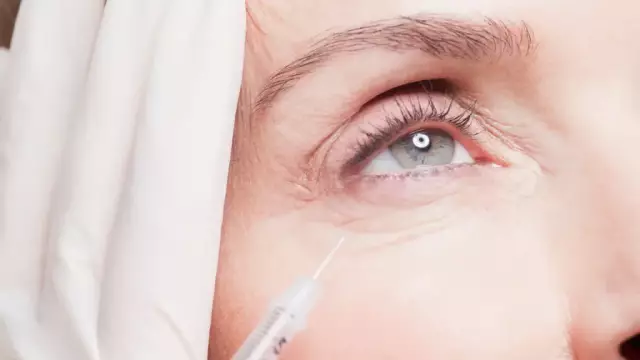- Author Rachel Wainwright wainwright@abchealthonline.com.
- Public 2023-12-15 07:39.
- Last modified 2025-11-02 20:14.
BoriVit
BoriVit: instructions for use and reviews
- 1. Release form and composition
- 2. Pharmacological properties
- 3. Indications for use
- 4. Contraindications
- 5. Method of application and dosage
- 6. Side effects
- 7. Overdose
- 8. Special instructions
- 9. Application during pregnancy and lactation
- 10. Use in childhood
- 11. In case of impaired renal function
- 12. For violations of liver function
- 13. Use in the elderly
- 14. Drug interactions
- 15. Analogs
- 16. Terms and conditions of storage
- 17. Terms of dispensing from pharmacies
- 18. Reviews
- 19. Price in pharmacies
Latin name: BoryVit
ATX code: A11DB
Active ingredient: pyridoxine hydrochloride (Pyridoxini hydrochloridum), cyanocobalamin (Cyanocobalamin), thiamine hydrochloride (Thiamine hydrochloride) + additionally for solution - lidocaine hydrochloride (Lidocaine hydrochloride)
Producer: JSC Borisov Plant of Medical Products (JSC "BZMP") (Republic of Belarus)
Description and photo update: 2019-09-07

BoriVit is a complex of B vitamins.
Release form and composition
- solution for intramuscular (i / m) administration: red transparent liquid (2 ml in an ampoule, 10 ampoules with a knife / scarifier for opening ampoules in a cardboard box);
- film-coated tablets: biconvex, round, pink (10 pcs. in a blister strip, 3 packages in a cardboard box).
Each pack also contains instructions for using BoriVit.
2 ml of solution for intramuscular administration contains:
- active substances: pyridoxine hydrochloride - 100 mg, thiamine hydrochloride - 100 mg, cyanocobalamin - 1 mg, lidocaine hydrochloride - 20 mg;
- additional components: potassium hexacyanoferrate, sodium tripolyphosphate, sodium hydroxide, benzyl alcohol, water for injection.
1 tablet contains:
- active substances: pyridoxine hydrochloride - 200 mg, thiamine hydrochloride - 100 mg, cyanocobalamin - 0.2 mg;
- additional components: microcrystalline cellulose, povidone, magnesium stearate, Opadray 200 (F) series [including talc, polyvinyl alcohol, partially hydrolyzed, macrogol 3350 (polyethylene glycol), titanium dioxide E 171, methacrylic acid copolymer type C, iron oxide yellow / red / black E 172, sodium bicarbonate E 500ii).
Pharmacological properties
Pharmacodynamics
BoriVit contains neurotropic B vitamins, which have a beneficial effect on degenerative and inflammatory lesions of the nerves and locomotor system. In high doses, active substances demonstrate an analgesic effect, promote an increase in blood flow, normalize the function of the nervous system and the course of hematopoiesis. These vitamins are essential nutrients that cannot be synthesized by the body. With their insufficient intake with food, BoriVit replenishes the deficiency of vitamins B 1, B 6 and B 12 in the body.
The action of the vitamin complex is determined by the properties of its active ingredients:
- thiamine (vitamin B 1): plays a major role in the metabolism of carbohydrates and in the Krebs cycle with further participation in the production of thiamine pyrophosphate (TPP) and adenosine triphosphate (ATP);
- pyridoxine (vitamin B 6): participates in the metabolism of proteins and, in part, fats and carbohydrates; the physiological function of vitamins B 1 and B 6 is to potentiate the effect of each other, which manifests itself in a positive effect on the activity of the nervous, neuromuscular and cardiovascular systems; with a lack of vitamin B 6, after the entry of these substances into the body, widespread deficiency states can be quickly stopped;
- cyanocobalamin (vitamin B 12): takes part in the synthesis of the myelin sheath, stimulates the process of hematopoiesis, reduces pain caused by diseases of the peripheral nervous system; activating folic acid, normalizes nucleic acid metabolism;
- lidocaine (solution): has a local anesthetic effect, causing all types of local anesthesia - conduction, infiltration, terminal.
Pharmacokinetics
The vitamins that make up BoriVit are water-soluble, which excludes the possibility of their accumulation in the body.
After the i / m injection of BoriVit, there is a rapid absorption of thiamine and pyridoxine and their further entry into the blood. On the first day of the course, 15 minutes after the injection of the drug at a dose of 50 mg, the thiamine content in the blood is 484 ng / ml. When distributed in the body, pyridoxine plays an important role as a coenzyme after phosphorylation of the CH 2 OH group in the fifth position. Thiamine is distributed unevenly, its content in blood plasma is 10%, in leukocytes - 15%, erythrocytes - 75%. Since the body lacks large reserves of this vitamin, its intake should be daily.
Thiamine and pyridoxine cross the placenta and are detected in breast milk. Vitamin B 1 also crosses the blood-brain barrier. The content of vitamin B 6 in the body can vary from 40 to 150 mg, the daily rate of its elimination is approximately 1.7-3.6 mg, and the replenishment rate is 2.2-2.4%.
After oral administration, absorption of pyridoxine and thiamine occurs in the upper intestine, the degree of their absorption depends on the dose. The absorption of cyanocobalamin is largely determined by the presence of an intrinsic factor in the stomach and upper intestine, and then cyanocobalamin is transferred to various tissues by the transport protein transcobalamin II.
Metabolic transformation of pyridoxine, thiamine and cyanocobalamin is carried out in the liver.
The main metabolites of thiamine are thiamincarboxylic acid and pyramine, as well as some unknown metabolites. Thiamine in the body, when compared with other vitamins, is retained in the smallest quantities. The organs and tissues of an adult contain about 30 mg of thiamine, of which 10% is in the form of thiamine triphosphate, 80% is thiamine pyrophosphate, and the rest is in the form of thiamine monophosphate. Thiamine is excreted in the urine, the half-life (T 1/2) of the α-phase is 0.15 hours, the β-phase is 1 hour and the terminal phase is for 2 days.
Pyridoxine is oxidized in the liver to 4-pyridoxinic acid, which is eliminated in the urine no later than 2-5 hours after absorption. In case of an overdose with oral administration, the excretion of pyridoxine and thiamine in the feces is significantly increased.
Cyanocobalamin is excreted mainly in the bile, the degree of excretion by the kidneys can vary from 6 to 30%.
Indications for use
BoriVita is recommended for the symptomatic therapy of neurological disorders of various origins, caused by a deficiency of B vitamins, which cannot be eliminated through nutritional correction.
Contraindications
Absolute:
- pregnancy and the period of breastfeeding;
- age up to 18 years - for tablets, up to 12 years - for solution;
- hypersensitivity to any of the components of BoriVit.
Additional absolute contraindications for the solution:
- severe heart failure;
- atrioventricular block (AV block) of II and III degrees;
- Wolff-Parkinson-White syndrome (WPW syndrome);
- sick sinus syndrome (SSS);
- Adams-Stokes syndrome;
- complete transverse heart block;
- cardiogenic shock;
- bradycardia;
- severe arterial hypotension;
- severe renal / hepatic impairment;
- porphyria;
- myasthenia gravis;
- hypovolemia;
- history of epileptiform seizures associated with the administration of lidocaine hydrochloride;
- hypersensitivity to other amide local anesthetics.
Relative contraindications (BoriVit should be used with caution):
- impaired renal / liver function;
- elderly age.
Additional relative contraindications for the solution (BoriVit should be used in smaller doses):
- heart failure;
- incomplete AV block, intraventricular conduction disturbances;
- arterial hypertension;
- epilepsy;
- violations of the liver and / or kidneys;
- period after heart surgery;
- genetic predisposition to hyperthermia;
- weakened state.
BoriVit, instructions for use: method and dosage
Film-coated tablets
BoriVit tablets are taken orally after meals, without chewing or crushing, with a small amount of liquid.
Recommended dosage regimen: 1-3 times a day, 1 tablet. After taking Borivit for 4 weeks, in order to reduce the threat of neuropathy, it is necessary to consider the possibility of reducing the daily dose to 1 tablet.
The duration of treatment is set individually by the attending physician.
Solution for i / m administration
The solution is injected intramuscularly, deeply.
In case of acute pain or severe course of the disease, it is recommended to give BoriVit injections every day, 1 time per day, 2 ml (contents of 1 ampoule). In milder forms of lesion or after relieving an exacerbation, the drug should be administered in the same daily dose 2-3 times a week, followed by the transfer of the patient to the oral form of the drug.
From the side of the doctor during the period of therapy, weekly monitoring is required. The transition to BoriVit tablets should, if possible, be carried out as early as possible.
The drug is intended only for intramuscular administration, if the solution was accidentally injected intravenously (intravenously), specialist supervision is necessary. After a course of parenteral treatment, as well as in the periods between injections of the solution or with a weak degree of severity of the disease, it is recommended to switch to the use of oral medications that include B vitamins.
Before using lidocaine, it is necessary to conduct a skin test for individual sensitivity to the drug; signs of intolerance may be swelling and redness of the injection site.
Side effects
- allergic reactions: very rarely - skin rash (for tablets), urticaria, itching, Quincke's edema, shortness of breath, anaphylactic shock;
- skin and subcutaneous fat: rarely - acne, increased sweating;
- cardiovascular system: single messages - tachycardia;
- digestive system (for tablets): extremely rare - nausea;
- nervous system (for tablets): single spontaneous messages - peripheral sensory neuropathy in case of prolonged use of BoriVit (over 6 months); isolated cases - headache;
- systemic reactions against the background of very rapid administration of a solution or an overdose: nausea, dizziness, bradycardia, arrhythmia, convulsions.
Overdose
Film-coated tablets
Oral intake of vitamin B 1 overdose symptoms were not recorded.
When taking vitamin B 6 in a daily dose of more than 2000 mg, the following disorders were noted: sensitivity disorder, neuropathy with ataxia, cerebral convulsions with EEG changes; extremely rare - seborrheic dermatitis, hypochromic anemia.
In rare cases, after oral administration of vitamin B 12, mild acne, skin eczema, and allergic reactions were observed.
The development of any symptoms of an overdose of B vitamins may require supportive and symptomatic therapy.
Solution for i / m administration
Symptoms of an overdose of the solution may include arrhythmia, dizziness, convulsions, which are also possible with very rapid administration of the drug. Treatment is symptomatic.
After parenteral use of vitamin B 12 in high doses, a mild form of acne, skin eczema, and allergic reactions were recorded. With the development of these symptoms, it is recommended to carry out supportive and symptomatic treatment.
Signs of an overdose of lidocaine are: dizziness, general weakness, vomiting, nausea, visual impairment, asthenia, psychomotor agitation, disorientation, tremor, AV blockade, apnea, euphoria, tonic-clonic seizures, lowering blood pressure, bradycardia, collapse, coma, asphyxia … In healthy people, the first symptoms can be observed when the level of lidocaine hydrochloride in the blood exceeds 0.006 mg / kg, convulsions - at 0.01 mg / kg.
In case of an overdose of lidocaine, it is necessary to stop the drug administration, conduct oxygen therapy, introduce vasoconstrictors (mezaton, norepinephrine), anticholinergics, anticonvulsants. The patient must be in a horizontal position, it is required to provide fresh air, artificial respiration and / or oxygen supply. For disorders of the central nervous system, benzodiazepines or short-acting barbiturates are used. In order to correct conduction disorders and bradycardia, atropine (0.5-1 mg) is prescribed, with the development of arterial hypotension, sympathomimetics are combined with β-adrenergic receptor agonists. In case of cardiac arrest, urgent resuscitation measures are carried out, intubation, artificial ventilation of the lungs may be indicated.
Dialysis in the acute phase of lidocaine overdose is not effective. No specific antidote known.
special instructions
With the development of signs of peripheral sensory neuropathy (paresthesia), it is recommended to reduce the dose of BoriVit or stop therapy. The emergence of neuropathy was noted with long-term use (6-12 months) of vitamin B 6 in daily doses of more than 50 mg, as well as against the background of its use for 2 months in daily doses of more than 1000 mg.
Taking drugs containing cyanocobalamin can affect the clinical picture and the results of laboratory studies of pernicious anemia.
When the solution is injected into vascularized tissues, an aspiration test is required and the drug should be injected with extreme caution to prevent accidental ingestion of lidocaine into the bloodstream.
Before using lidocaine in high doses, the appointment of barbiturates is indicated.
In the case of treatment of the injection site with disinfectant solutions containing heavy metals, the risk of a local reaction in the form of edema and soreness is aggravated.
Influence on the ability to drive vehicles and complex mechanisms
BoriVit does not affect the speed and adequacy of the patient's psychomotor reactions, thereby preserving his ability to drive a car and other complex mechanisms.
Application during pregnancy and lactation
The use of BoriVit during pregnancy and during breastfeeding is contraindicated, since there are no reliable clinical data confirming the effectiveness and safety of drug therapy in pregnant and lactating women.
Pediatric use
Due to the presence of vitamins in high doses in both dosage forms of BoriVit, as well as benzyl alcohol in the solution, it is contraindicated to prescribe the solution to children under 12 years old, tablets - to children and adolescents under 18 years old.
With impaired renal function
It is recommended to use the drug with caution in case of impaired renal function.
BoriVit solution is contraindicated for use in severe renal failure.
For violations of liver function
The drug should be used with caution in case of violations of the liver.
BoriVit solution is contraindicated for use in severe hepatic insufficiency.
Use in the elderly
Borovit should be used with caution in the elderly. No dose adjustment is required for patients of this age group.
Drug interactions
Interaction of all forms of BoriVit's release with other drugs / substances:
- solutions containing sulfites: cause the complete destruction of thiamine;
- levodopa: its effect decreases under the influence of pyridoxine;
- other vitamins: their action is inactivated in the presence of decay products of B vitamins;
- furosemide: against the background of prolonged use of this agent, the renal excretion of thiamine may increase;
- oxidizing agents, including mercury chloride, iodide, acetate, carbonate, tannic acid, iron-ammonium citrate, as well as riboflavin, phenobarbital, benzylpenicillin, metabisulfite, dextrose: these agents are incompatible with thiamine;
- cycloserine, D-penicillamine, norepinephrine, epinephrine, sulfonamides: interaction of these substances with the drug is possible, leading to a weakening of the effect of pyridoxine;
- copper: accelerates the breakdown of thiamine;
- heavy metal salts: incompatibility with cyanocobalamin is noted;
- 5-fluorouracil: the effect of thiamine is inactivated due to the competitive inhibition of thiamine phosphorylation by this substance;
- ethanol, antacids, tea: absorption of thiamine decreases.
Interaction reactions that are possible with the simultaneous use of BoriVit solution containing lidocaine with other drugs / agents (these combinations must be carried out with extreme caution):
- norepinephrine, epinephrine: possible aggravation of undesirable effects on the heart with the additional use of these funds against the background of parenteral use of lidocaine; joint use is contraindicated in case of an overdose of local anesthetics;
- ethanol: the inhibitory effect on respiratory function is aggravated;
- hypnotics and sedatives: the depressing effect on the central nervous system increases;
- rifampicin: the content of lidocaine in the blood decreases;
- monoamine oxidase (MAO) inhibitors: the threat of arterial hypotension with parenteral administration of lidocaine is aggravated;
- polymyxin B: monitoring of respiratory function is recommended;
- novocaine, novocainamide, procainamide: the likelihood of hallucinations increases;
- anesthetics, including sodium thiopental and hexobarbital (i.v.); sedatives and hypnotics: the depressing effect of these drugs on the respiratory center is enhanced;
- cardiac glycosides: their cardiotonic effect is weakened; with intoxication of these funds, it is possible to increase the severity of the AV block;
- izadrin, glucagon: there is an increase in the clearance of lidocaine;
- mexiletine, norepinephrine: the toxicity of lidocaine increases due to a decrease in its clearance;
- curariform drugs: muscle relaxation may deepen, up to paralysis of the respiratory muscles;
- midazolam: increases the content of lidocaine in the blood plasma;
- β-adrenergic receptor blockers: the metabolic rate of lidocaine in the liver decreases, the severity of its effects (including toxic ones) increases and the threat of arterial hypertension and bradycardia increases;
- antiarrhythmics (verapamil, amiodarone, aymalin, quinidine, propafenone, disopyramide), hydantoin derivatives: there is an increase in the cardiodepressant effect; the combination with amiodarone can cause the development of seizures;
- drugs that block neuromuscular transmission: the effect of these drugs is enhanced;
- phenytoin: the cardiodepressant effect of lidocaine increases;
- metoxamine, epinephrine, phenylephrine and other vasoconstrictors: there is a slowdown in the absorption of lidocaine and prolongation of its action;
- prenylamine: increased risk of ventricular arrhythmias such as pirouette;
- morphine: increases the analgesic effect of this agent.
Analogs
BoriVit's analogues are Kombilipen, Neuromultivit, Neurobion, Neovitam, Neuromed, Neurobeks, Neuromed forte, Neurovit, Milgamma, Vitagamma, etc.
Terms and conditions of storage
Keep out of reach of children. Tablets at a temperature not exceeding 25 ° C, in a dark, dry place; solution at a temperature of 2-8 ° C.
Shelf life is 2 years.
Terms of dispensing from pharmacies
Dispensed by prescription.
Reviews about BoriVit
On medical sites, reviews about BoriVit (mainly in the form of tablets) are usually positive. Patients note that after a course of treatment with the drug, their general condition has significantly improved, their vitality has increased. The vitamin complex helped to relieve irritability, nervousness, mood swings in premenstrual syndrome, helped to increase hair volume and accelerate hair growth.
There are no complaints about unwanted effects.
Price for BoriVit in pharmacies
The price of BoriVit is unknown, since this vitamin complex is not available for sale.
In the Republic of Belarus its cost is approximately: solution for intramuscular injection - 9-10 rubles. (BYN) for 10 ampoules of 2 ml; coated tablets - 4-5 rubles. per package containing 30 pcs.

Maria Kulkes Medical journalist About the author
Education: First Moscow State Medical University named after I. M. Sechenov, specialty "General Medicine".
Information about the drug is generalized, provided for informational purposes only and does not replace the official instructions. Self-medication is hazardous to health!






